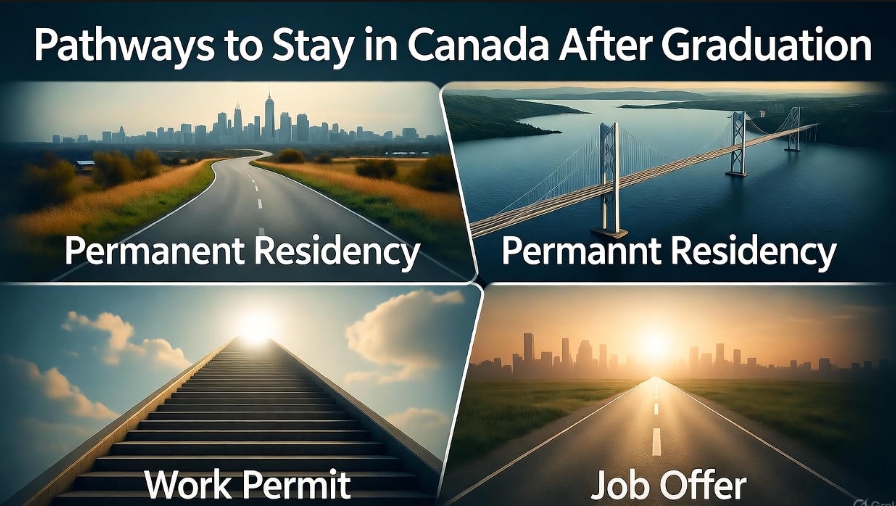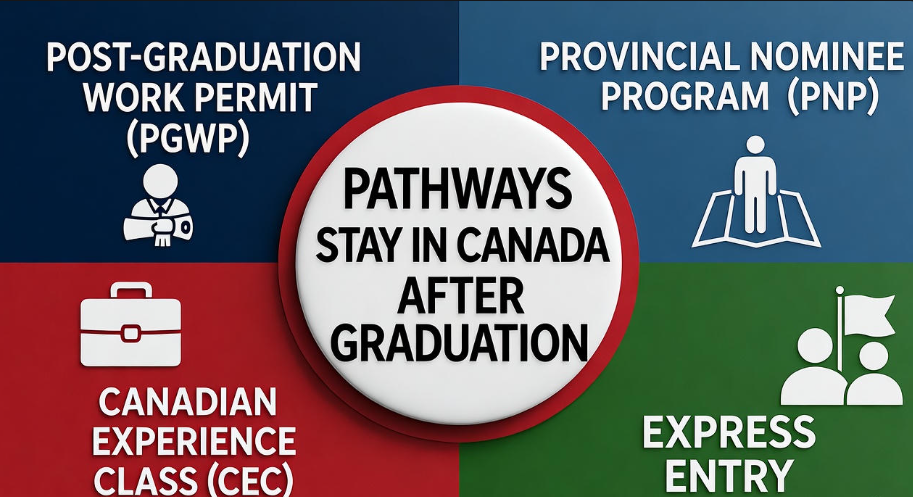Introduction: Your Journey from Graduation to Canadian Permanent Residency
Graduating from a Canadian institution is a significant achievement, but for many international students, the next step is securing the right to live and work in Canada long-term. Fortunately, Canada offers several pathways to help you transition from a student to a permanent resident.
Post-Graduation Work Permit (PGWP): Your First Step
The PGWP allows graduates from eligible Designated Learning Institutions (DLIs) to work in Canada for a duration equal to their study program, up to a maximum of three years. This work experience is invaluable and can enhance your profile for permanent residency applications.
Express Entry: The Fast-Track to Permanent Residency
The Express Entry system is a popular route for skilled workers, including international graduates. By gaining skilled work experience in Canada, you can improve your Comprehensive Ranking System (CRS) score, increasing your chances of receiving an Invitation to Apply (ITA) for permanent residency.
Canadian Experience Class (CEC): For Those with Canadian Work Experience
The CEC is a federal immigration program designed for individuals who have gained skilled work experience in Canada. If you’ve worked in Canada under a PGWP, you may be eligible to apply through this program, provided you meet the necessary criteria.
Provincial Nominee Program (PNP): Tailored to Provincial Needs
Each province and territory in Canada has its own PNP, allowing them to nominate individuals for permanent residency based on local labor market needs. If you’ve studied and worked in a specific province, you may be eligible for nomination, which can significantly boost your chances of obtaining permanent residency.
Quebec Experience Program (PEQ): For Graduates in Quebec
If you’ve completed your studies in Quebec, the PEQ offers a streamlined pathway to permanent residency. This program is designed for individuals who have obtained a diploma from a Quebec institution and have intermediate-advanced proficiency in French.
Atlantic Immigration Program (AIP): For Graduates in Atlantic Canada
The AIP is aimed at attracting and retaining skilled workers in the Atlantic provinces. Graduates from designated learning institutions in Atlantic Canada may be eligible to apply for permanent residency through this program, provided they have a job offer from a designated employer.
Rural and Northern Immigration Pilot (RNIP): For Graduates in Participating Communities
The RNIP is a community-driven program that supports the economic development of smaller communities in Canada. If you’ve studied and worked in one of the participating communities, you may be eligible to apply for permanent residency through this pilot.
Agri-Food Immigration Pilot: For Graduates in the Agri-Food Sector
This pilot program is designed to address labor shortages in the agri-food sector. If you’ve studied and worked in this field in Canada, you may be eligible to apply for permanent residency through this program.
Caregiver Pathways: For Graduates in Caregiving Professions
Canada offers specific pathways for individuals who have worked as caregivers. If you’ve completed a caregiving program in Canada and have relevant work experience, you may be eligible to apply for permanent residency through these pathways.
Family Sponsorship: If You Have Family in Canada
If you have a spouse, common-law partner, or dependent child who is a Canadian citizen or permanent resident, they may be able to sponsor you for permanent residency. This process involves meeting specific eligibility criteria and demonstrating the genuineness of your relationship.
Humanitarian and Compassionate Grounds: A Last Resort
In exceptional cases, individuals may apply for permanent residency on humanitarian and compassionate grounds. This is typically considered when there are compelling reasons, such as family ties or risk of hardship, that warrant an exception to standard immigration requirements.
Staying in Canada After Your PGWP Expires
If your PGWP is nearing expiration and you haven’t secured permanent residency, you have a few options:
-
Apply for a Visitor Visa: This allows you to stay in Canada temporarily while you prepare your permanent residency application.
-
Transition to a Different Work Permit: If you find an employer willing to support your application, you may be eligible for a different type of work permit.
-
Explore Other Immigration Pathways: Depending on your situation, other programs like the PNP or RNIP may be viable options.
Conclusion: Planning Your Pathway to Permanent Residency
Securing permanent residency in Canada after graduation requires careful planning and timely action. By understanding the various pathways available and meeting the necessary criteria, you can enhance your chances of successfully transitioning from a student to a permanent resident.

Frequently Asked Questions (FAQs)
Q1: Can I apply for permanent residency while still on my PGWP?
Yes, you can apply for permanent residency while on your PGWP, provided you meet the eligibility criteria for the specific immigration program you’re applying under.
Q2: How long do I have to apply for permanent residency after my PGWP expires?
It’s advisable to apply for permanent residency before your PGWP expires. If it expires, you may need to transition to a different status, such as a visitor visa, while your application is processed.
Q3: Do I need a job offer to apply for permanent residency?
It depends on the immigration program. Programs like the Canadian Experience Class do not require a job offer, while others, like the Provincial Nominee Program, may.
Q4: Can my family accompany me if I become a permanent resident?
Yes, as a permanent resident, you can sponsor eligible family members, including your spouse, common-law partner, and dependent children, to join you in Canada.
Q5: What happens if my permanent residency application is refused?
If your application is refused, you may have the option to appeal the decision or reapply, depending on the reasons for refusal and the specific immigration program.
Navigating the pathways to permanent residency in Canada can be complex, but with the right information and preparation, you can successfully transition from a student to a permanent resident.




